-
 Bitcoin
Bitcoin $84,566.1805
-0.57% -
 Ethereum
Ethereum $1,592.2699
-0.60% -
 Tether USDt
Tether USDt $0.9999
0.00% -
 XRP
XRP $2.0827
0.05% -
 BNB
BNB $595.0697
0.54% -
 Solana
Solana $133.8668
-0.51% -
 USDC
USDC $0.9999
0.01% -
 Dogecoin
Dogecoin $0.1581
0.11% -
 TRON
TRON $0.2414
-3.25% -
 Cardano
Cardano $0.6267
0.55% -
 UNUS SED LEO
UNUS SED LEO $9.2366
2.17% -
 Chainlink
Chainlink $12.5949
0.15% -
 Avalanche
Avalanche $19.1131
-0.90% -
 Toncoin
Toncoin $3.0082
1.10% -
 Stellar
Stellar $0.2418
0.58% -
 Shiba Inu
Shiba Inu $0.0...01233
3.67% -
 Hedera
Hedera $0.1654
1.00% -
 Sui
Sui $2.1393
-0.24% -
 Bitcoin Cash
Bitcoin Cash $342.0697
2.59% -
 Litecoin
Litecoin $76.9074
1.71% -
 Polkadot
Polkadot $3.6967
1.20% -
 Hyperliquid
Hyperliquid $16.8937
0.83% -
 Dai
Dai $0.9999
-0.03% -
 Bitget Token
Bitget Token $4.3923
0.72% -
 Ethena USDe
Ethena USDe $0.9991
0.00% -
 Pi
Pi $0.6199
0.69% -
 Monero
Monero $217.2905
0.20% -
 Uniswap
Uniswap $5.1988
-0.89% -
 Pepe
Pepe $0.0...07244
-1.72% -
 OKB
OKB $50.5192
-0.32%
What is "state channel" of blockchain?
State channels enhance blockchain scalability by moving transactions off-chain, reducing network load and enabling fast, low-cost microtransactions between users.
Mar 31, 2025 at 09:00 am
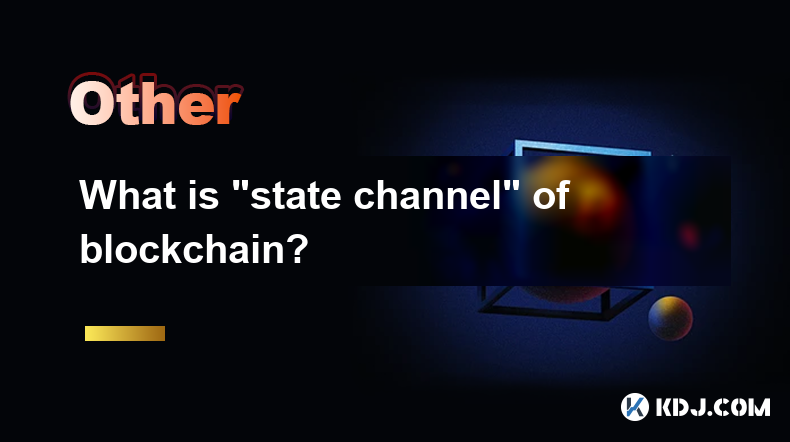
Understanding State Channels: Off-Chain Scaling Solutions
State channels offer a powerful solution to one of the biggest challenges facing blockchain networks: scalability. Traditional blockchains process every transaction on the main chain, leading to congestion and high fees, especially during periods of high activity. State channels address this by moving many transactions off-chain, only requiring updates to the main blockchain periodically. This significantly reduces the load on the main network. Think of it like having a side conversation with someone instead of announcing every detail to the entire room.
How State Channels Work: A Step-by-Step Guide
Imagine Alice and Bob want to exchange cryptocurrency many times. Instead of broadcasting each transaction to the blockchain, they open a state channel. This involves a transaction on the main chain establishing an initial state, defining how much cryptocurrency each party initially holds. The process unfolds as follows:
- Channel Opening: Alice and Bob create a smart contract on the blockchain, specifying the initial state of their funds.
- Off-Chain Transactions: Alice and Bob then exchange cryptocurrency multiple times without involving the blockchain. They only update their shared state.
- State Updates: Each transaction is recorded in a series of signed messages exchanged between Alice and Bob. These messages contain the updated state.
- Channel Closing: When Alice and Bob finish their transactions, they close the channel. This involves a final transaction on the blockchain reflecting the final state of their funds. This transaction settles all off-chain transactions.
This process allows for numerous transactions to occur quickly and cheaply off-chain. The only blockchain interaction happens at the beginning and end of the channel.
Security and Privacy in State Channels
A crucial aspect of state channels is their security. The use of cryptographic signatures ensures that only Alice and Bob can update the channel state. This prevents unauthorized modifications. Each update is digitally signed by both parties, guaranteeing its validity. The final settlement transaction on the blockchain is also cryptographically secured, preventing fraud. Furthermore, the transactions within the channel are private, visible only to Alice and Bob, improving user privacy. This privacy is a significant advantage over on-chain transactions, which are publicly recorded.
Types of State Channels
While the fundamental principle remains the same, different state channel implementations exist, each with its own nuances and applications. One key distinction lies in the underlying cryptographic mechanisms used to secure the channel and manage the state updates. Some channels utilize simpler cryptographic techniques suitable for smaller-scale transactions, while others employ more complex methods for larger-scale applications. The choice of implementation depends heavily on the specific use case and the desired level of security and scalability.
State Channels vs. Other Scaling Solutions
State channels are just one approach to scaling blockchains. Other methods include sharding, which divides the blockchain into smaller, more manageable parts, and layer-2 solutions, which build on top of the existing blockchain to handle transactions more efficiently. State channels differ from these in their focus on off-chain transactions between specific participants, making them particularly well-suited for frequent interactions between a small number of users. Sharding and layer-2 solutions, on the other hand, aim for broader network-wide scalability.
Limitations of State Channels
Despite their advantages, state channels have limitations. They are most effective for frequent interactions between a small number of participants. Scaling to a large number of participants becomes complex and less efficient. Furthermore, the initial setup of a state channel requires a transaction on the main chain, which can be expensive and time-consuming. The need for participants to remain online throughout the channel's lifecycle is another constraint. If one participant becomes unavailable, the channel might need to be closed prematurely.
Real-World Applications of State Channels
State channels are finding practical applications in various areas. One notable example is in payment systems, where they enable fast and low-cost microtransactions. They are also being explored for decentralized exchanges (DEXs), allowing for faster and more efficient trading. Furthermore, state channels can be used in supply chain management, enabling secure and transparent tracking of goods. The potential applications are diverse and continue to expand as the technology matures.
The Future of State Channels
Ongoing research and development are focused on improving the efficiency and scalability of state channels. Efforts are underway to address the limitations mentioned earlier, such as the complexity of managing a large number of participants and the requirement for continuous online participation. New cryptographic techniques and protocols are being developed to enhance security and reduce the overhead associated with channel management. As these improvements materialize, state channels are likely to play an increasingly important role in scaling blockchain networks.
Frequently Asked Questions
Q: Are state channels secure?
A: Yes, state channels utilize cryptographic techniques to ensure the security and integrity of transactions. Each state update is digitally signed by all participating parties, preventing unauthorized modifications. The final settlement transaction on the blockchain further guarantees the security of the overall process.
Q: How do state channels improve scalability?
A: State channels improve scalability by moving many transactions off the main blockchain. This significantly reduces the load on the network, leading to faster transaction times and lower fees. Only the initial setup and final settlement transactions need to be processed on the main chain.
Q: What are the limitations of state channels?
A: State channels are most effective for frequent interactions between a small number of participants. Scaling to a large number of participants can be complex. Participants also need to remain online throughout the channel's lifecycle. The initial setup can be expensive and time-consuming.
Q: What are some real-world applications of state channels?
A: State channels are used in payment systems for fast and low-cost microtransactions. They are also being explored for decentralized exchanges (DEXs) and supply chain management. The potential applications are diverse and continue to grow.
Q: How do state channels compare to other scaling solutions?
A: State channels differ from sharding and layer-2 solutions in their focus on off-chain transactions between specific participants. They are best suited for frequent interactions between a small number of users, while other solutions aim for broader network-wide scalability.
Disclaimer:info@kdj.com
The information provided is not trading advice. kdj.com does not assume any responsibility for any investments made based on the information provided in this article. Cryptocurrencies are highly volatile and it is highly recommended that you invest with caution after thorough research!
If you believe that the content used on this website infringes your copyright, please contact us immediately (info@kdj.com) and we will delete it promptly.
- Oregon AG Sues Coinbase Over Token Sales
- 2025-04-19 03:20:13
- Bank of America Is Attempting to Monopolize the Stablecoin Market
- 2025-04-19 03:20:13
- Bitcoin (BTC) price could take a hit after US Federal Reserve reports some of the worst manufacturing data in recent history
- 2025-04-19 03:15:13
- ADA Price Prediction: Bold Prediction Lit Up the Cardano Community This Week
- 2025-04-19 03:15:13
- Push For Bitcoin Reserve Gains Momentum In Brazil
- 2025-04-19 03:10:15
- HashKey Capital Launches Asia's First XRP Tracker Fund—with Ripple as an Early Investor.
- 2025-04-19 03:10:15
Related knowledge
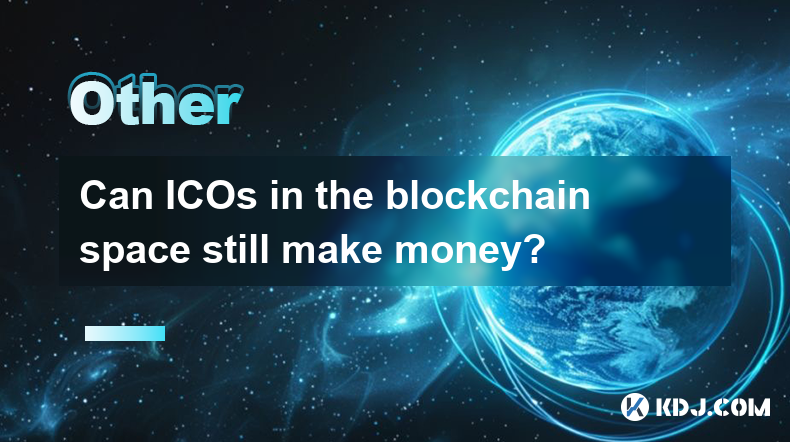
Can ICOs in the blockchain space still make money?
Apr 17,2025 at 08:29pm
The landscape of Initial Coin Offerings (ICOs) in the blockchain space has evolved significantly since their peak in 2017 and 2018. Despite the increased regulatory scrutiny and the rise of alternative fundraising methods like Security Token Offerings (STOs) and Initial Exchange Offerings (IEOs), ICOs can still be a viable way to raise funds and generat...
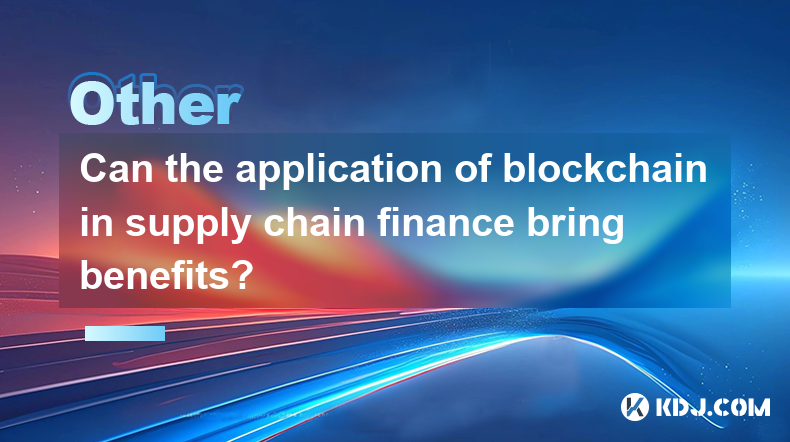
Can the application of blockchain in supply chain finance bring benefits?
Apr 15,2025 at 04:00pm
Can the application of blockchain in supply chain finance bring benefits? The integration of blockchain technology into supply chain finance has garnered significant attention in the cryptocurrency and financial sectors. This article explores how blockchain can potentially revolutionize supply chain finance, detailing its benefits and providing a compre...

Does the ranking of Chinese blockchain apps include cross-chain applications?
Apr 14,2025 at 04:00pm
The ranking of Chinese blockchain apps is a comprehensive evaluation that takes into account various aspects such as user base, transaction volume, and technological innovation. A pertinent question arises regarding whether these rankings include cross-chain applications. Cross-chain applications, which allow different blockchain networks to interact an...
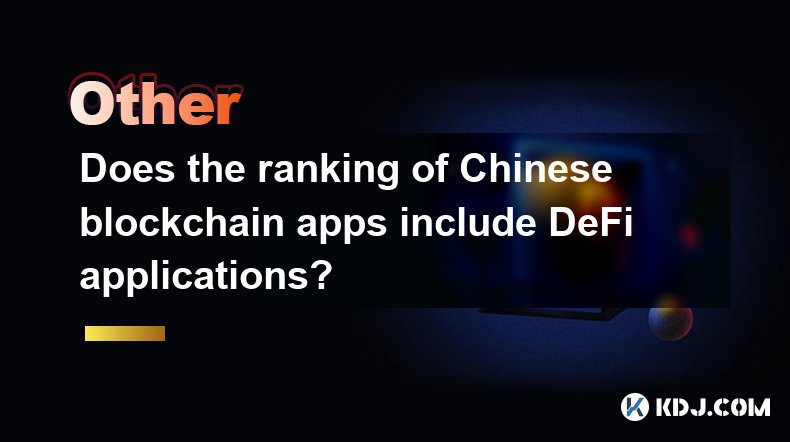
Does the ranking of Chinese blockchain apps include DeFi applications?
Apr 15,2025 at 06:57am
The ranking of Chinese blockchain apps is a comprehensive list that showcases the most popular and influential applications within the cryptocurrency ecosystem. One question that often arises is whether these rankings include DeFi applications. To answer this, we need to delve into the specifics of how these rankings are compiled and what types of appli...
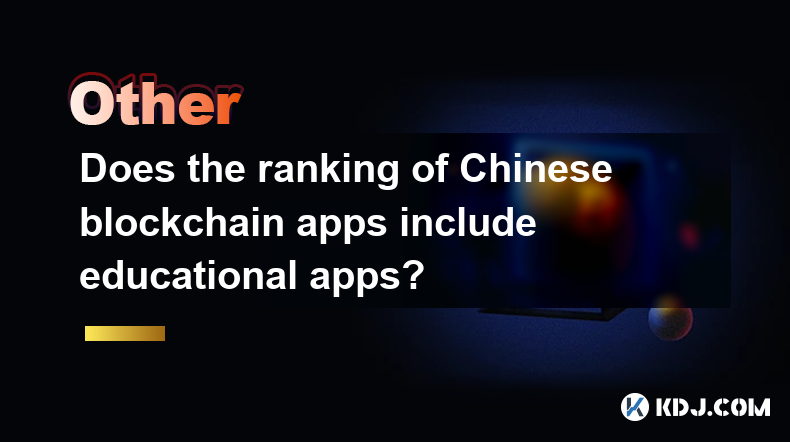
Does the ranking of Chinese blockchain apps include educational apps?
Apr 16,2025 at 03:35am
The ranking of Chinese blockchain apps often includes a variety of categories, from finance and gaming to social networking and beyond. One question that frequently arises is whether these rankings include educational apps. To address this, we need to delve into the specifics of how blockchain apps are categorized and ranked in China, and whether educat...
Does the ranking of Chinese blockchain apps include enterprise-level applications?
Apr 15,2025 at 06:42am
The ranking of Chinese blockchain apps often includes a variety of applications, ranging from consumer-focused to enterprise-level solutions. Understanding the scope and criteria for these rankings is essential to determine if enterprise-level applications are included. This article delves into the specifics of how Chinese blockchain app rankings are co...

Can ICOs in the blockchain space still make money?
Apr 17,2025 at 08:29pm
The landscape of Initial Coin Offerings (ICOs) in the blockchain space has evolved significantly since their peak in 2017 and 2018. Despite the increased regulatory scrutiny and the rise of alternative fundraising methods like Security Token Offerings (STOs) and Initial Exchange Offerings (IEOs), ICOs can still be a viable way to raise funds and generat...

Can the application of blockchain in supply chain finance bring benefits?
Apr 15,2025 at 04:00pm
Can the application of blockchain in supply chain finance bring benefits? The integration of blockchain technology into supply chain finance has garnered significant attention in the cryptocurrency and financial sectors. This article explores how blockchain can potentially revolutionize supply chain finance, detailing its benefits and providing a compre...

Does the ranking of Chinese blockchain apps include cross-chain applications?
Apr 14,2025 at 04:00pm
The ranking of Chinese blockchain apps is a comprehensive evaluation that takes into account various aspects such as user base, transaction volume, and technological innovation. A pertinent question arises regarding whether these rankings include cross-chain applications. Cross-chain applications, which allow different blockchain networks to interact an...

Does the ranking of Chinese blockchain apps include DeFi applications?
Apr 15,2025 at 06:57am
The ranking of Chinese blockchain apps is a comprehensive list that showcases the most popular and influential applications within the cryptocurrency ecosystem. One question that often arises is whether these rankings include DeFi applications. To answer this, we need to delve into the specifics of how these rankings are compiled and what types of appli...

Does the ranking of Chinese blockchain apps include educational apps?
Apr 16,2025 at 03:35am
The ranking of Chinese blockchain apps often includes a variety of categories, from finance and gaming to social networking and beyond. One question that frequently arises is whether these rankings include educational apps. To address this, we need to delve into the specifics of how blockchain apps are categorized and ranked in China, and whether educat...

Does the ranking of Chinese blockchain apps include enterprise-level applications?
Apr 15,2025 at 06:42am
The ranking of Chinese blockchain apps often includes a variety of applications, ranging from consumer-focused to enterprise-level solutions. Understanding the scope and criteria for these rankings is essential to determine if enterprise-level applications are included. This article delves into the specifics of how Chinese blockchain app rankings are co...
See all articles
























































































